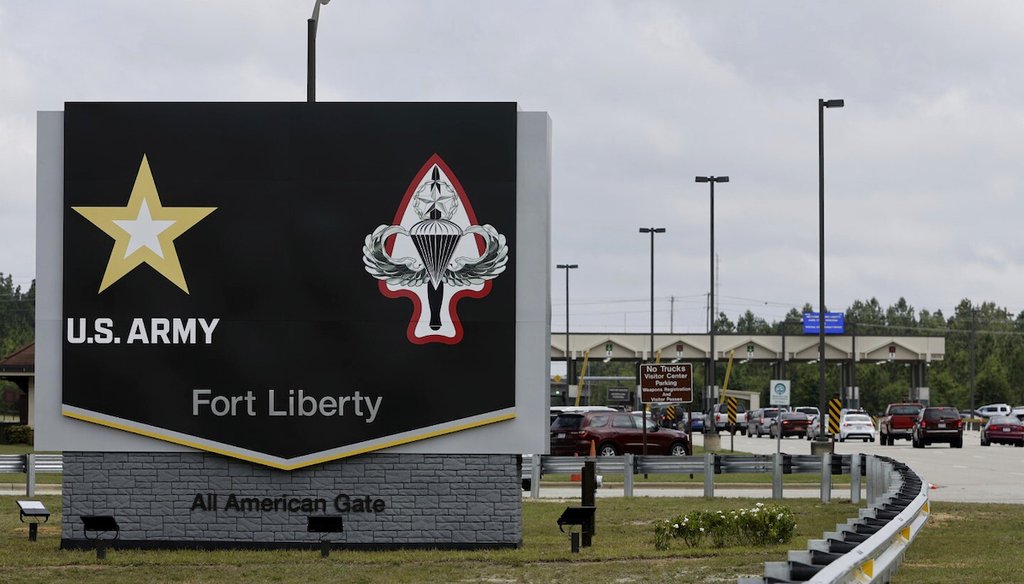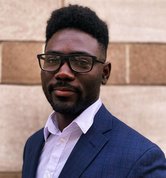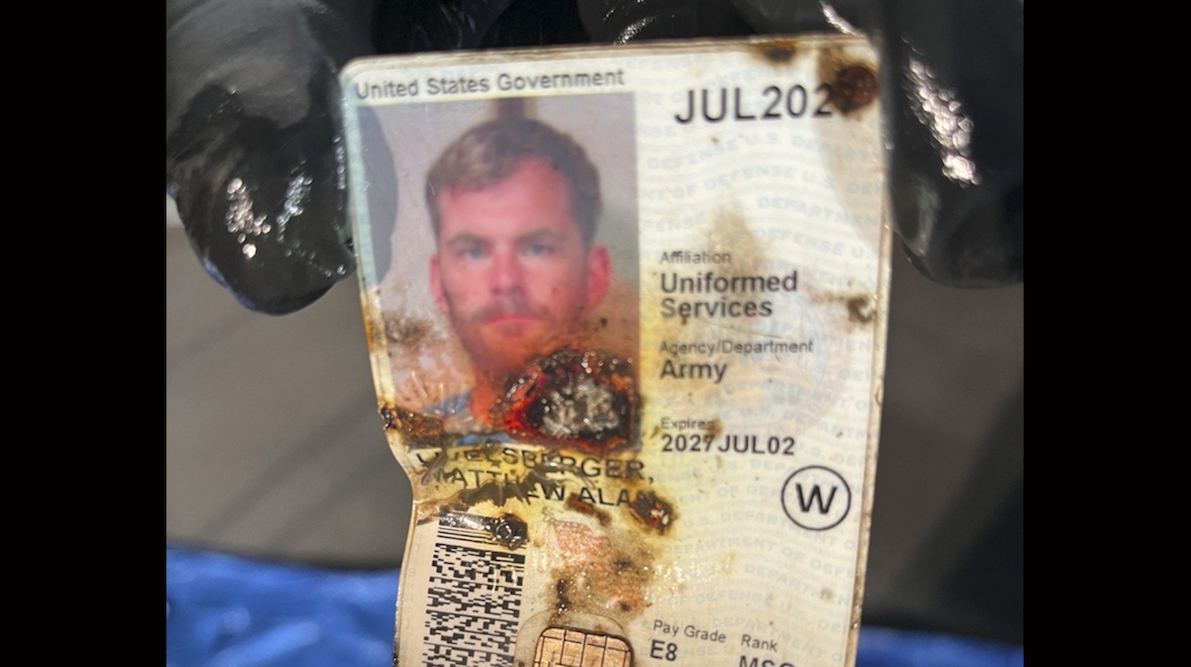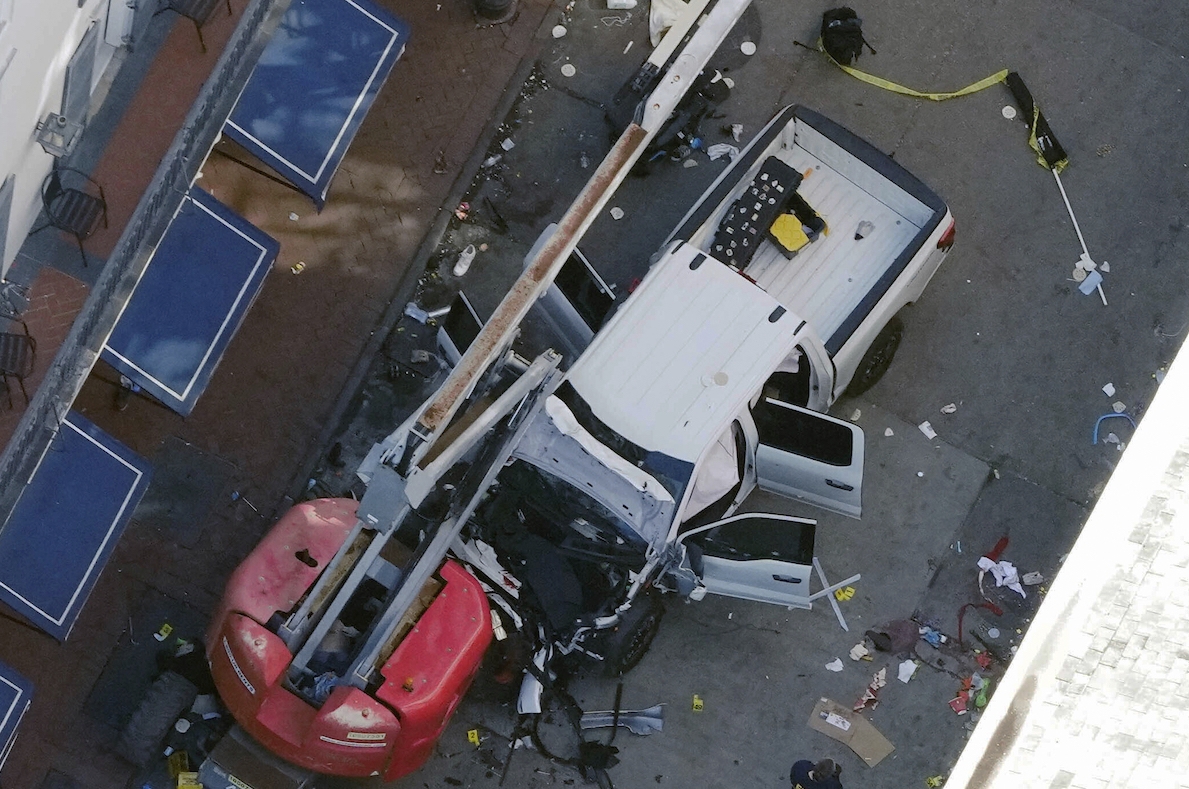Stand up for the facts!
Our only agenda is to publish the truth so you can be an informed participant in democracy.
We need your help.
I would like to contribute

The Fort Liberty sign is displayed outside the base onJune 2, 2023 in Fort Liberty, N.C. The U.S. Army changed Fort Bragg to Fort Liberty as part of a broader initiative to remove Confederate names from bases. (AP)
Social media posts are making links between the terrorist attack in New Orleans and the vehicle explosion outside the Trump International Hotel in Las Vegas on New Year’s Day — because the suspects served at Fort Liberty, a large military base in North Carolina formerly known as Fort Bragg.
Some posts stated definitively that the two suspects served at Fort Bragg at the same time and that the incidents were "coordinated."
A Jan. 2 X post claimed: "So the FBI is telling us that there are NO DEFINITIVE links between the terror attacks in Las Vegas and New Orleans even though both suspects served at Fort Bragg. Since the FBI has never misled us before, we should trust them right?"
Tesla CEO and X owner Elon Musk amplified an X post to his 210 million followers that also suggested a link to the U.S. Army base. That post claimed that Ryan Wesley Routh, who is awaiting trial on charges he plotted to kill President-elect Donald Trump, visited the same base over 100 times.
Routh is a former Greensboro, North Carolina, resident. He did not serve in the U.S. military and we found no credible news reports that he visited Fort Liberty on multiple occasions. We contacted the Justice Department for comment, but received no response.
Sign up for PolitiFact texts
But law enforcement officials, while saying the New Year’s Day incidents’ investigations continue, have said there’s no evidence of a connection between the two events.
The FBI named Shamsud-Din Jabbar as the driver of the truck that killed at least 14 New Year’s Eve revelers in New Orleans. Jabbar died in a shootout with police, officials said. The FBI said Jabbar was a United States citizen and U.S. Army veteran from Texas.
Matthew Livelsberger, the suspect in the Tesla Cybertruck explosion on New Year’s Day in Las Vegas, was an active-duty soldier on official leave. Officials said he died of a self-inflicted shotgun wound to the head before the vehicle packed with fireworks detonated outside the Trump hotel.
A U.S. Army spokesperson did not answer PolitiFact’s specific questions about whether the two suspects’ service overlapped at Fort Liberty or elsewhere, citing the continuing investigations.
This undated photo shows an ID belonging to Matthew Livelsberger, found dead inside a Tesla Cybertruck outside the Trump Hotel in Las Vegas. (Las Vegas Metropolitan Police Department)
At a Jan. 3 news conference in Las Vegas, Clark County Sheriff Kevin McMahill said Livelsberger left behind two letters, in which he wrote about personal challenges, political grievances, societal issues and other subjects. Assistant Sheriff Dori Koren shared excerpts from the letters. In one, Livelsberger wrote the explosion was "not a terrorist attack," and that he did it partly to "relieve myself of the burden of the lives I took."
FBI Special Agent Spencer Evans also said Jan. 3 that "there is no evidence that these two events are connected."
There are incidental connections, such as them both serving in the military, but "we've identified no telephonic or email communication between the subjects, no information that suggests that they knew each other, that they ever served in the same unit, that they were ever assigned at the same place, at the same time and had interaction," Evans said.
No witness interviews have provided any evidence that the two events are connected, Evans said.
Evans’ statement echoed FBI deputy assistant director Christopher Raia’s Jan. 2 statement that there was "no definitive link" between the New Orleans attack and the Las Vegas explosion.
Jabbar had declared support for the Islamic State terror group last summer, Raia said.
Evans said witness interviews show Livelsberger had no animosity toward Trump and that Army information shows "he likely suffered from PTSD (post-traumatic stress disorder).
"Although this incident is more public and more sensational than usual, it ultimately appears to be a tragic case of suicide involving a heavily decorated combat veteran who is struggling with PTSD and other issues," Evans said.
McMahill also said at a Jan. 2 news conference that Jabbar and Livelsberger had each spent time at Fort Liberty and both men served in Afghanistan in 2009 but there was no evidence their service overlapped.
The News & Observer, a Fayetteville, North Carolina, newspaper reported that Livelsberger’s wife shared social media photos and listed their residence as Fayetteville in 2013. The outlet reported that records show Jabbar "lived in Cumberland County near the Army post then named Fort Bragg between roughly 2010 and 2015."
A U.S. Army spokesperson told PolitiFact that Livelsberger served in the active-duty Army from January 2006 to March 2011, then joined the National Guard until July 2012 and the Army Reserve until December 2012. He then reentered the active-duty Army in December 2012 and served as a Special Operations soldier assigned to the 10th Special Forces Group in Germany. He was on approved leave when he died, the spokesperson said.
Jabbar was a human resource specialist and information technology specialist in the Army from March 2007 to January 2015, then served in the Army Reserve until 2020. He deployed to Afghanistan from February 2009 to January 2010, the spokesperson said.
An Islamic State flag lies on the ground rolled up behind the pickup truck that Shamsud-Din Jabbar drove into a crowd on Bourbon Street in Jan. 1, 2025, in New Orleans. (AP)
Fort Liberty is the largest U.S. Army base by population, according to the Defense Department. There are more than 43,000 active-duty soldiers, 11,000 civilian employees and more than 62,000 family members of active-duty soldiers living on the base.
Known previously as Fort Bragg, the base was renamed in June 2023 as part of U.S. Army efforts to remove place names honoring Confederate soldiers.
Tim Nichols, a Duke University visiting professor and former U.S. Marine Corps intelligence officer, said most U.S. soldiers pass through Fort Liberty at some point in their service. It's not unusual that Jabbar and Livelsberger each served there, he said.
"It's a very desired post. It has a number of elite military units that people strive to get into," Nichols said.
Nichols said people shouldn't politicize the military and draw any conspiratorial conclusions about the base and the two suspects.
"To say that it's some kind of conspiratorial effort out of Fort Liberty would really deny the fact that there are tens of thousands of hardworking honest service members who are really trying to keep the nation safe despite all of this kind of chaos that’s happening domestically right now," Nichols said.
Nichols said the military has policies to try to prevent radicalization, but it’s a problem bigger than the military, he said.
"Young people who have certain experiences in their lives develop vulnerabilities to radicalization, and it takes a social system to identify these and to provide help," Nichols said. "The military, above and beyond many others, is really trying hard to address these systems."
The military needs to redouble its efforts to identify and help any members susceptible to radicalization and hold them accountable should they become violent, he said.
Our Sources
X post, Jan. 2, 2025
Elon Musk, X post, Jan. 2, 2025
Email interview, U.S. Army spokesperson, Jan. 3, 2025
Interview, Tim Nichols, Duke University visiting public policy professor, Jan. 3, 2025
The News & Observer, Men behind New Orleans attack, Las Vegas explosion both served at Fort Liberty in NC , Jan. 2, 2025
Louisiana Illuminator, ‘Very strange similarities’ but no link yet between Las Vegas bombing, New Orleans terror attack, Jan. 2, 2025
The Associated Press, Soldier shot self in head before Cybertruck exploded outside Trump’s Las Vegas hotel, officials say, Jan. 2, 2025
Las Vegas Metropolitan Police, LVMPD provides new details in the explosion investigation, Jan. 2, 2025
Las Vegas Metropolitan Police, LVMPD Provides New Details in Explosion at Trump Hotel Las Vegas, Jan. 3, 2025
Las Vegas Metropolitan Police, Update - Suspect Identified by Coroner - LVMPD Provides Update on Vehicle Explosion at Hotel Property, Jan. 2, 2025
Matt Livelsberger, LinkedIn page, accessed Jan. 3, 2025
FBI, Bourbon Street Attack Investigation Updates, accessed Jan. 3, 2025
The Associated Press, FBI gives update on New Year’s Day attack in New Orleans, Jan. 2, 2025
U.S. Department of Defense, Fort Liberty, accessed Jan. 2, 2025























